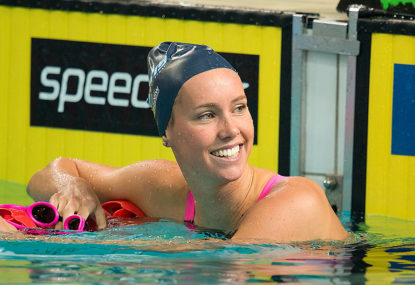JackJumpers' NBL title was special - but where does it sit among Tasmania’s top ten sporting moments?
It’s a pretty good time to be a Tasmanian sports fan right now. After years in the sporting wilderness with not much to celebrate,…

The recent world championship results from Kazan were the brightest news Swimming Australia has received for years.
If the Rio Olympics were the next election, the swimmers party is polling well. But federal sporting fortunes can match politics for unpredictability, so there must be a cone of measured optimism humming over the considerable bureaucracy ministering to the needs of swimmers, coaches, and that bureaucracy itself.
So, what did Kazan return for such high policy stakes?
It delivered ‘Serena rising’ (Bronte Campbell) as having finally risen, for starters. Her wins in the 50 and 100 freestyle were dominant. As an entity, the Campbell sisters must now be a warm bookies’ favourite to win gold in the Rio 50 or 100 freestyle, and a favourite for the double.
Whoever wins the right to partner them in the 4×100 freestyle relay will likely be able to call themselves Olympic champions for life.
In winning the 100m and 200m backstroke double, Emily Seebohm stamped herself as a mature talent, having served her apprenticeship with minor placings for long enough. Overcoming a significant knee injury several months before Kazan showed Seebohm demonstrated a psychological depth on top of her obvious physical power and ability.
Mitch Larkin, currently studying for a double degree at uni, took out a 100m and 200m backstroke double. His calm, urbane interviewing style, on top of his academic achievements, must have minders hoping the days of rowdy, self trumpeting male achievers are a thing of the past.
His likely influence bodes well for Rio team morale, although let’s not use the term ‘bonding’. Likewise convivial physics major Cameron McEvoy kept himself in the Rio mix by placing a close second in his pet event, the 100 free.
‘The Worlds’ failed to provide the expected platform for distance swimmer Mack Horton to realise his considerable potential. Ominously, he was all at sea with his pacing in the heats of his first event the 400m freestyle. For a swimmer not to know his pace is like an Eagle being unfamiliar with the horizon, and alarm bells should have been ringing immediately.
He did subsequently trouble the leaders in either the subsequent 800m or 1500m freestyle. The continuing inability of the high profile McKeon siblings (Emma and David) to dominate on the world stage must also be a concern, though both will contribute to relay gold medal hopes.
The pair hover in and out of world top three rankings in various events and special attention must be given to their widely acknowledged motivational challenges. Both the siblings’ parents were internationals and ‘generational burnout’ is an uncomfortable but widely known syndrome in swimming.
Yet with the right approach, neither sibling should be written off for an individual gold in Rio.
For what it’s worth, Australia finished fourth in the medal count in Kazan. But for the purists who don’t count water polo, diving and synchronised swimming (facetious purists can even exclude breaststroke), Australia came a clear second, sandwiched between the U.S. and China.
But do world championships rate? To accurately quantify their worth against the Olympics would be futile. Let’s just say its like the difference between buying a Ferrari and a top spec Range Rover. You know the Ferrari will be doing the rounds of the concours d’ elegance in 20 years, while the Rangie will be some kid’s repair project, starting with those annoying seat springs starting to poke through.
Regardless, there could be few Australian Olympic sports happier with where they stand one year from Rio.